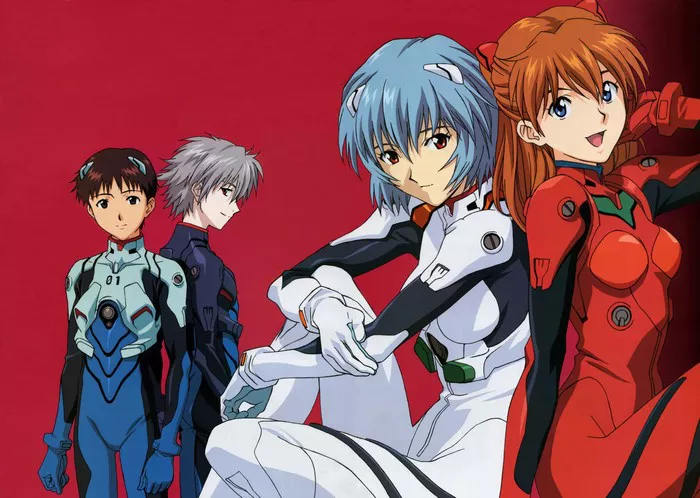Since its debut in 1995, Neon Genesis Evangelion has captivated audiences around the world with its complex narrative, philosophical themes, and groundbreaking animation. Yet, beneath its surface lies a web of controversy and debate that continues to intrigue fans and critics alike. In this article, we delve into the myriad factors that have contributed to the enigmatic and divisive nature of Neon Genesis Evangelion, examining its legacy as one of the most controversial anime series of all time.
Introduction: A Cultural Phenomenon
Neon Genesis Evangelion, created by Hideaki Anno and produced by Gainax, stands as a seminal work in the anime genre, transcending its status as a mere television series to become a cultural phenomenon. Set in a dystopian future where humanity faces extinction at the hands of enigmatic beings known as Angels, the series follows the struggles of a group of teenagers piloting giant mechs called Evangelions to protect humanity’s last bastion, Tokyo-3. Yet, as the series progresses, it delves into deeper psychological, philosophical, and existential themes that challenge viewers’ perceptions and defy easy categorization.
The Deconstruction of Mecha Anime: Breaking Boundaries
At its core, Neon Genesis Evangelion serves as a deconstruction of the mecha anime genre, subverting many of its established tropes and conventions. Rather than glorifying the heroics of its young protagonists, the series portrays them as flawed, vulnerable individuals grappling with trauma, identity crisis, and existential angst. The mechs themselves, far from being mere tools of warfare, are revealed to be living beings with their own consciousness, blurring the lines between man and machine.
Existential Angst and Psychological Depth: The Human Condition
One of the most striking aspects of Neon Genesis Evangelion is its exploration of the human condition and the existential angst that accompanies it. Through its protagonist, Shinji Ikari, the series delves into themes of isolation, loneliness, and the search for meaning in a world devoid of purpose. Shinji’s struggle to find his place in the world and connect with others resonates deeply with audiences, prompting introspection and self-reflection.
Sexuality and Identity: Taboos and Taboos Broken
Neon Genesis Evangelion doesn’t shy away from exploring taboo subjects such as sexuality, identity, and mental illness. The series depicts complex relationships between its characters, including ambiguous romantic entanglements, same-sex attraction, and Freudian undertones that challenge societal norms and expectations. This frank portrayal of human sexuality and desire sparked controversy and debate, with some critics praising its boldness and others condemning it as gratuitous or exploitative.
Religious Symbolism and Interpretation: Unraveling the Mysteries
One of the most enduring sources of controversy surrounding Neon Genesis Evangelion is its abundant use of religious symbolism and imagery. Drawing from Christian, Jewish, and Kabbalistic traditions, the series incorporates motifs such as Angels, Adam and Lilith, the Tree of Life, and the End of Days into its narrative, imbuing it with layers of meaning and interpretation. While some viewers praise the series’ depth and complexity, others criticize it for appropriating religious iconography without proper context or understanding.
Narrative Ambiguity and Psychological Horror: Mind-Bending Storytelling
As Neon Genesis Evangelion reaches its climax, it descends into a maelstrom of psychological horror and narrative ambiguity that challenges viewers’ perceptions and expectations. The series’ final episodes, often referred to as the “End of Evangelion,” eschew traditional storytelling conventions in favor of surreal imagery, abstract symbolism, and existential musings that leave audiences bewildered and disoriented. This deliberate obfuscation of meaning has divided fans, with some hailing it as a masterstroke of avant-garde storytelling and others deriding it as pretentious or incomprehensible.
Legacy and Influence: An Enduring Impact
Despite—or perhaps because of—its controversial nature, Neon Genesis Evangelion has left an indelible mark on the anime industry and popular culture as a whole. Its influence can be seen in countless works of fiction, from anime and manga to film, literature, and video games. Its themes of existential angst, psychological introspection, and the search for meaning continue to resonate with audiences of all ages, ensuring its place as a timeless classic that defies easy categorization.
Conclusion: A Reflection of the Human Experience
In the final analysis, the controversy surrounding Neon Genesis Evangelion is a testament to its power to provoke thought, stimulate discussion, and challenge the status quo. By daring to explore taboo subjects, defy genre conventions, and embrace narrative ambiguity, the series transcends its status as mere entertainment to become a profound meditation on the human experience and the eternal struggle to find meaning in a world fraught with uncertainty. Whether hailed as a masterpiece or dismissed as divisive, Neon Genesis Evangelion remains an enduring testament to the boundless creativity and complexity of the human imagination.


